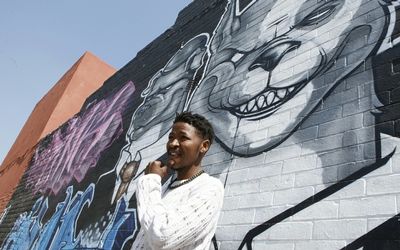Mogorosi project spices up Cape Town jazz fest line-up
by Gwen Ansell,
2016-03-18 05:00:00.0
IT WAS drummer Tumi Mogorosi’s SAMA-nominated debut album, Project ELO, which brought him to national attention. That sonorous, processional sextet outing, rich with voices, but definitely a drummer’s creation, took the National Arts Festival in Grahamstown by storm in 2014, winning a gold Standard Bank Ovation Award. And that, plus growing critical and audience acclaim, probably contributed to his spot on the coveted Rosie’s Stage at the Cape Town International Jazz Festival next week.
But while that sound is still consolidating, Mogorosi has also moved in a different direction. His next project, Sanctum Sanctorum — set for release next month just after the festival — is a far more intimate collaboration led by a human voice.
The role of the drums is to support, enhance and texturise voice lines crafted by life and musical partner Gabisile Motuba. It was recorded in Switzerland during a Pro Helvetia-supported tour last October, and also features pianist Malcolm Braff, bassist Sebastian Schuster and cellist Andreas Plattner.
Mamelodi-born Motuba was co-lyricist and vocalist on Project ELO, and those are roles she has expanded to include composition for the new project. It’s dedicated to baby daughter Thari, and the title, although Latin for "Holy of Holies", speaks not of one religion, but of "mother, father and child in the broadest spiritual sense", she says. "The music has a very Gregorian chant feel: straightforward melodies, but an eclectic, almost classical texture, underlined by the cello, especially when it doubles on the vocal lines with me."
YET there are commonalities with Project ELO in the music’s rhythmic concepts. Motuba cites the track Thari e nntsu: "There’s a conscious reference there to the kind of music the late Zim Ngqawana was shaping and inspiring," Motuba says. "Simple lines and AA or AB structures, pulsed rhythms natural as a heartbeat — music the way we feel it as Africans, in a way others wouldn’t." That’s important to her.
Although Esperanza Spalding’s Precious was an early inspiration, and she admires singers such as Gretchen Parlato, Motuba is seeking a different direction. "When you try to duplicate the American thing, you’re going to come off second-best. I’m still expanding my awareness of my own space, musical and social. I don’t want, yet, to be at a point where audiences think they know me: I’m a slow-burn."
Inevitably, close musical collaborators influence one another, and new musical ideas filter back into established repertoire.
The Project ELO on stage in Cape Town will not be a precise echo of the 2013 album sound, and will be richer and more intriguing for that growth.
It won’t be the only musical surprise. Since the artist announcements in December, the festival has strengthened its offering, with the addition of Moroccan violinist Hicham Telmoudi, and Swedish-Turkish reedman Ilham Ersahin. Add these to Malian vocal duo Amadou and Mariam, Derek Gripper’s Mali-inspired music and the Rahul Sharma/George Brooks India/US collaboration and the event looks convincing as a showcase not only for jazz and pop, but for world music too.
Telmoudi’s lush sounds are descended from the long tradition of Andalusian classical music, where western, Arab and North African instruments appear alongside one another, and the violin is played vertically on the knee, in the manner of the Berber kamenjah.
Marrakesh-born Telmoudi holds distinctions in traditional and European string playing and is professor of music at the Marrakesh Conservatoire. Like its cousin, the Malian njarka gourd-fiddle, the Moroccan violin argues that no instrument is owned by one nationality, and that the violin sounds with which we are more familiar are only one colour on a diverse sonic palette.
ERSAHIN is based in New York, but commutes regularly to Istanbul. He has worked with a trumpeter familiar to South African festival-goers: Frenchman Eric Truffaz. The saxophonist’s Istanbul Sessions (with two albums now out under that title) developed from attempts to establish a modern jazz club; the venues did not last, but the crowd, mood and feel of the music grew into something dubbed the "Nublu Sound" (after a space and a record label Ersahin opened in Manhattan), incorporating electro beats and free jazz, as well as influences from his own homeland and those of musicians he worked with in New York. He took the music back to Istanbul, working there with a Turkish rhythm section, and was also instrumental in organising jazz festivals in the city, asserting its identity as an intense, cosmopolitan musical crossroads.
• Tumi Mogorosi plays the Rosie’s Stage at 21.15 on April 1
• Hicham Telmoudi plays the Moses Molelekwa stage at 20.15 on April 1
• Ilhan Ersahin’s Istanbul Sessions play the Moses Molelekwa Stage at 19.15 on April 2

Tumi Mogorosi . Picture: MOHAU MOFOKENG/SOWETAN
IT WAS drummer Tumi Mogorosi’s SAMA-nominated debut album, Project ELO, which brought him to national attention. That sonorous, processional sextet outing, rich with voices, but definitely a drummer’s creation, took the National Arts Festival in Grahamstown by storm in 2014, winning a gold Standard Bank Ovation Award. And that, plus growing critical and audience acclaim, probably contributed to his spot on the coveted Rosie’s Stage at the Cape Town International Jazz Festival next week.
But while that sound is still consolidating, Mogorosi has also moved in a different direction. His next project, Sanctum Sanctorum — set for release next month just after the festival — is a far more intimate collaboration led by a human voice.
The role of the drums is to support, enhance and texturise voice lines crafted by life and musical partner Gabisile Motuba. It was recorded in Switzerland during a Pro Helvetia-supported tour last October, and also features pianist Malcolm Braff, bassist Sebastian Schuster and cellist Andreas Plattner.
Mamelodi-born Motuba was co-lyricist and vocalist on Project ELO, and those are roles she has expanded to include composition for the new project. It’s dedicated to baby daughter Thari, and the title, although Latin for "Holy of Holies", speaks not of one religion, but of "mother, father and child in the broadest spiritual sense", she says. "The music has a very Gregorian chant feel: straightforward melodies, but an eclectic, almost classical texture, underlined by the cello, especially when it doubles on the vocal lines with me."
YET there are commonalities with Project ELO in the music’s rhythmic concepts. Motuba cites the track Thari e nntsu: "There’s a conscious reference there to the kind of music the late Zim Ngqawana was shaping and inspiring," Motuba says. "Simple lines and AA or AB structures, pulsed rhythms natural as a heartbeat — music the way we feel it as Africans, in a way others wouldn’t." That’s important to her.
Although Esperanza Spalding’s Precious was an early inspiration, and she admires singers such as Gretchen Parlato, Motuba is seeking a different direction. "When you try to duplicate the American thing, you’re going to come off second-best. I’m still expanding my awareness of my own space, musical and social. I don’t want, yet, to be at a point where audiences think they know me: I’m a slow-burn."
Inevitably, close musical collaborators influence one another, and new musical ideas filter back into established repertoire.
The Project ELO on stage in Cape Town will not be a precise echo of the 2013 album sound, and will be richer and more intriguing for that growth.
It won’t be the only musical surprise. Since the artist announcements in December, the festival has strengthened its offering, with the addition of Moroccan violinist Hicham Telmoudi, and Swedish-Turkish reedman Ilham Ersahin. Add these to Malian vocal duo Amadou and Mariam, Derek Gripper’s Mali-inspired music and the Rahul Sharma/George Brooks India/US collaboration and the event looks convincing as a showcase not only for jazz and pop, but for world music too.
Telmoudi’s lush sounds are descended from the long tradition of Andalusian classical music, where western, Arab and North African instruments appear alongside one another, and the violin is played vertically on the knee, in the manner of the Berber kamenjah.
Marrakesh-born Telmoudi holds distinctions in traditional and European string playing and is professor of music at the Marrakesh Conservatoire. Like its cousin, the Malian njarka gourd-fiddle, the Moroccan violin argues that no instrument is owned by one nationality, and that the violin sounds with which we are more familiar are only one colour on a diverse sonic palette.
ERSAHIN is based in New York, but commutes regularly to Istanbul. He has worked with a trumpeter familiar to South African festival-goers: Frenchman Eric Truffaz. The saxophonist’s Istanbul Sessions (with two albums now out under that title) developed from attempts to establish a modern jazz club; the venues did not last, but the crowd, mood and feel of the music grew into something dubbed the "Nublu Sound" (after a space and a record label Ersahin opened in Manhattan), incorporating electro beats and free jazz, as well as influences from his own homeland and those of musicians he worked with in New York. He took the music back to Istanbul, working there with a Turkish rhythm section, and was also instrumental in organising jazz festivals in the city, asserting its identity as an intense, cosmopolitan musical crossroads.
• Tumi Mogorosi plays the Rosie’s Stage at 21.15 on April 1
• Hicham Telmoudi plays the Moses Molelekwa stage at 20.15 on April 1
• Ilhan Ersahin’s Istanbul Sessions play the Moses Molelekwa Stage at 19.15 on April 2




















Change: 1.19%
Change: 1.36%
Change: 2.19%
Change: 1.49%
Change: -0.77%
Data supplied by Profile Data
Change: -0.19%
Change: 0.69%
Change: 1.19%
Change: 0.00%
Change: 0.44%
Data supplied by Profile Data
Change: 0.62%
Change: 0.61%
Change: 0.23%
Change: 0.52%
Change: 0.12%
Data supplied by Profile Data
Change: -0.21%
Change: -1.22%
Change: -0.69%
Change: -0.51%
Change: 0.07%
Data supplied by Profile Data